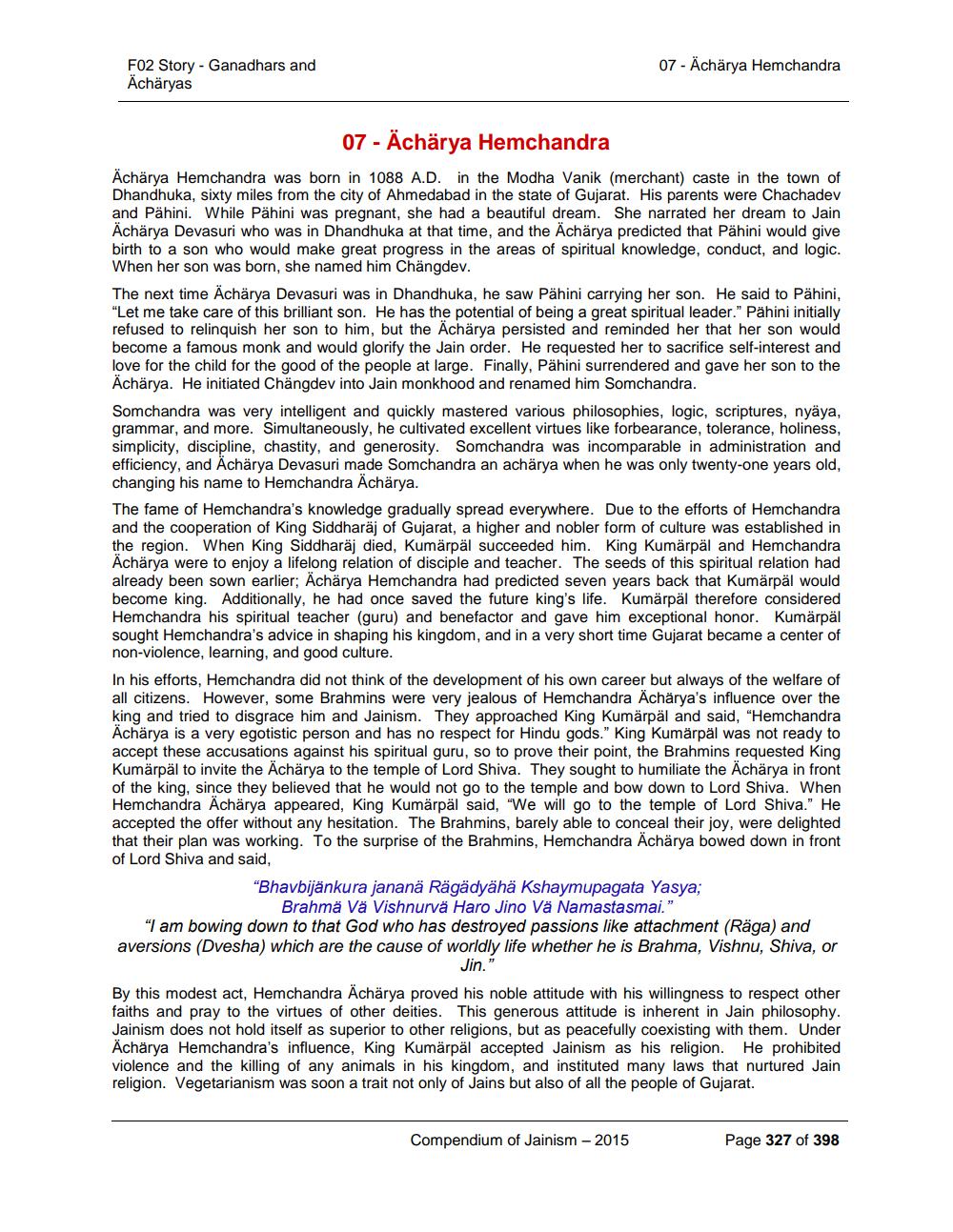________________
F02 Story - Ganadhars and Ächäryas
07 - Ächärya Hemchandra
07 - Ächärya Hemchandra
Acharya Hemchandra was born in 1088 A.D. in the Modha Vanik (merchant) caste in the town of Dhandhuka, sixty miles from the city of Ahmedabad in the state of Gujarat. His parents were Chachadev and Pähini. While Pähini was pregnant, she had a beautiful dream. She narrated her dream to Jain Acharya Devasuri who was in Dhandhuka at that time, and the Acharya predicted that Pähini would give birth to a son who would make great progress in the areas of spiritual knowledge, conduct, and logic. When her son was born, she named him Chängdev. The next time Acharya Devasuri was in Dhandhuka, he saw Pähini carrying her son. He said to Pähini, "Let me take care of this brilliant son. He has the potential of being a great spiritual leader." Pähini initially refused to relinquish her son to him, but the Acharya persisted and reminded her that her son would become a famous monk and would glorify the Jain order. He requested her to sacrifice self-interest and love for the child for the good of the people at large. Finally, Pähini surrendered and gave her son to the Acharya. He initiated Chängdev into Jain monkhood and renamed him Somchandra.
Somchandra was very intelligent and quickly mastered various philosophies, logic, scriptures, nyaya, grammar, and more. Simultaneously, he cultivated excellent virtues like forbearance, tolerance, holiness, simplicity, discipline, chastity, and generosity. Somchandra was incomparable in administration and efficiency, and Acharya Devasuri made Somchandra an achärya when he was only twenty-one years old, changing his name to Hemchandra Acharya. The fame of Hemchandra's knowledge gradually spread everywhere. Due to the efforts of Hemchandra and the cooperation of King Siddharäj of Gujarat, a higher and nobler form of culture was established in the region. When King Siddharäj died, Kumärpäl succeeded him. King Kumärpäl and Hemchandra Acharya were to enjoy a lifelong relation of disciple and teacher. The seeds of this spiritual relation had already been sown earlier; Acharya Hemchandra had predicted seven years back that Kumärpäl would become king. Additionally, he had once saved the future king's life. Kumärpäl therefore considered Hemchandra his spiritual teacher (guru) and benefactor and gave him exceptional honor. Kumärpäl sought Hemchandra's advice in shaping his kingdom, and in a very short time Gujarat became a center of non-violence, learning, and good culture. In his efforts, Hemchandra did not think of the development of his own career but always of the welfare of all citizens. However, some Brahmins were very jealous of Hemchandra Acharya's influence over the king and tried to disgrace him and Jainism. They approached King Kumärpäl and said, "Hemchandra Acharya is a very egotistic person and has no respect for Hindu gods." King Kumärpäl was not ready to accept these accusations against his spiritual guru, so to prove their point, the Brahmins requested King Kumärpäl to invite the Achärya to the temple of Lord Shiva. They sought to humiliate the Acharya in front of the king, since they believed that he would not go to the temple and bow down to Lord Shiva. When Hemchandra Acharya appeared, King Kumärpäl said, "We will go to the temple of Lord Shiva." He accepted the offer without any hesitation. The Brahmins, barely able to conceal their joy, were delighted that their plan was working. To the surprise of the Brahmins, Hemchandra Acharya bowed down in front of Lord Shiva and said,
"Bhavbijankura jananä Rägädyähä Kshaymupagata Yasya;
Brahmä Vä Vishnurvä Haro Jino Vä Namastasmai." "I am bowing down to that God who has destroyed passions like attachment (Räga) and aversions (Dvesha) which are the cause of worldly life whether he is Brahma, Vishnu, Shiva, or
Jin. By this modest act, Hemchandra Acharya proved his noble attitude with his willingness to respect other faiths and pray to the virtues of other deities. This generous attitude is inherent in Jain philosophy. Jainism does not hold itself as superior to other religions, but as peacefully coexisting with them. Under Acharya Hemchandra's influence, King Kumärpäl accepted Jainism as his religion. He prohibited violence and the killing of any animals in his kingdom, and instituted many laws that nurtured Jain religion. Vegetarianism was soon a trait not only of Jains but also of all the people of Gujarat.
Compendium of Jainism - 2015
Page 327 of 398




